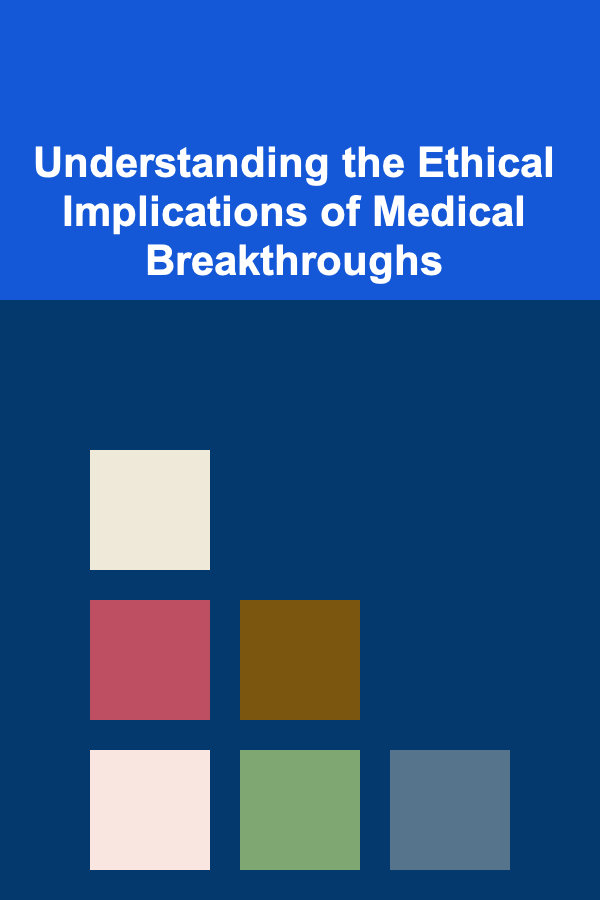
Understanding the Ethical Implications of Medical Breakthroughs
ebook include PDF & Audio bundle (Micro Guide)
$12.99$6.99
Limited Time Offer! Order within the next:

Medical breakthroughs represent significant advancements in our ability to diagnose, treat, and prevent diseases. These advancements, ranging from gene editing technologies like CRISPR to artificial intelligence-driven diagnostics and novel drug therapies, hold immense promise for improving human health and well-being. However, alongside their potential benefits, medical breakthroughs invariably raise complex ethical questions that demand careful consideration. Failing to address these ethical implications proactively can lead to unintended consequences, erode public trust, and ultimately hinder the responsible development and implementation of these potentially transformative technologies.
The Importance of Ethical Evaluation
Ethical evaluation of medical breakthroughs is not merely an academic exercise; it is a crucial step in ensuring that these advancements are used responsibly and for the benefit of all. There are several key reasons why a thorough ethical assessment is essential:
- Protecting Patient Autonomy: Medical interventions should respect the autonomy and self-determination of patients. Breakthroughs that bypass informed consent, compromise privacy, or exert undue influence on patient choices can undermine this fundamental ethical principle.
- Ensuring Justice and Equity: The benefits of medical breakthroughs should be accessible to all, regardless of their socioeconomic status, geographic location, or other factors. Failing to address issues of access and affordability can exacerbate existing health disparities and create new forms of injustice.
- Minimizing Harm and Maximizing Benefit: Medical interventions should strive to minimize potential harms while maximizing potential benefits. This requires a careful assessment of the risks and uncertainties associated with a new technology, as well as its potential impact on individuals, communities, and society as a whole.
- Maintaining Public Trust: Medical research and healthcare rely on public trust. When ethical concerns are ignored or dismissed, it can erode public confidence in the medical profession and undermine support for future research and innovation.
- Guiding Policy and Regulation: Ethical analysis provides a framework for developing appropriate policies and regulations to govern the development and use of medical breakthroughs. This helps to ensure that these technologies are used in a responsible and ethical manner.
Key Ethical Considerations
Understanding the ethical implications of medical breakthroughs requires a comprehensive examination of various ethical principles and values. Here are some of the key ethical considerations that should be addressed:
1. Beneficence and Non-Maleficence
These are fundamental principles of medical ethics. Beneficence refers to the obligation to act in the best interests of patients and to promote their well-being. Non-maleficence, on the other hand, requires healthcare professionals to avoid causing harm to patients. Evaluating a medical breakthrough through the lens of these principles involves carefully weighing the potential benefits against the potential risks. This assessment should consider not only the direct effects on patients but also the broader social and environmental impacts.
For example, consider the development of a new gene therapy for a previously untreatable genetic disorder. While the potential benefits of curing the disease are immense, there may also be risks associated with the therapy itself, such as off-target effects or immune reactions. A thorough ethical evaluation would require a careful assessment of these risks and benefits, taking into account the severity of the disease, the likelihood of success with the therapy, and the potential for long-term adverse effects.
2. Autonomy and Informed Consent
Autonomy is the right of individuals to make their own decisions about their health and medical care. Informed consent is the process by which patients are given the information they need to make informed decisions about their treatment options. Medical breakthroughs can sometimes challenge these principles. For example, technologies that allow for the collection and analysis of large amounts of patient data may raise concerns about privacy and confidentiality. Similarly, interventions that target vulnerable populations, such as children or individuals with cognitive impairments, may require special safeguards to ensure that their autonomy is respected.
The development of AI-powered diagnostic tools presents a specific challenge to informed consent. If a doctor relies heavily on an AI system for diagnosis, how much information about the AI's reasoning and limitations should be disclosed to the patient? Is it sufficient to simply say, "The AI says you have X"? Or should the patient be informed about the AI's accuracy rate, the data it was trained on, and the potential for bias?
3. Justice and Equity
Justice refers to the fair and equitable distribution of resources and opportunities. In the context of medical breakthroughs, this means ensuring that the benefits of new technologies are accessible to all, regardless of their socioeconomic status, geographic location, or other factors. Unfortunately, medical advancements often exacerbate existing health disparities. For example, new drugs and therapies may be too expensive for many people to afford, or they may only be available in wealthy countries. This raises ethical questions about how to ensure that medical breakthroughs are used to reduce, rather than increase, health inequalities.
Consider the development of personalized medicine approaches that tailor treatments to an individual's genetic profile. While this holds great promise for improving patient outcomes, it also raises concerns about access and affordability. If genetic testing is required to determine the most effective treatment, will this be available to everyone, or only to those who can afford it? If the benefits of personalized medicine are not shared equitably, it could further widen the gap between the rich and the poor.
4. Privacy and Confidentiality
Medical breakthroughs often involve the collection and analysis of large amounts of patient data, including genetic information, medical records, and lifestyle data. This raises important questions about privacy and confidentiality. Patients have a right to control their personal information and to be protected from unauthorized access or disclosure. However, the use of big data in medical research and healthcare can make it difficult to protect patient privacy. For example, even if data is anonymized, it may still be possible to re-identify individuals using advanced data analysis techniques. This raises concerns about the potential for misuse of patient data, such as discrimination or targeted advertising.
The increasing use of wearable devices and mobile health apps also raises privacy concerns. These devices can collect a wealth of information about an individual's health and activity levels. While this data can be used to improve health outcomes, it can also be vulnerable to hacking or unauthorized access. Patients need to be aware of the risks involved in sharing their data and to have control over how it is used.
5. Societal Impact and Public Perception
Medical breakthroughs can have a profound impact on society as a whole. For example, advances in life-extension technologies could lead to significant demographic shifts and place strain on social security systems. Similarly, genetic engineering technologies could raise concerns about the potential for unintended ecological consequences or the creation of new forms of discrimination. It is important to consider these broader societal implications when evaluating the ethical implications of medical breakthroughs.
Public perception also plays a crucial role in the acceptance and adoption of new medical technologies. If the public does not trust a particular technology or believes that it is morally objectionable, it may be difficult to implement it successfully. Therefore, it is important to engage the public in discussions about the ethical implications of medical breakthroughs and to address their concerns in a transparent and open manner. This can involve educational initiatives, public forums, and other forms of outreach.
6. The Role of Moral Intuition and "The Yuck Factor"
While rational ethical frameworks are essential, we must also acknowledge the role of moral intuition in shaping our responses to medical breakthroughs. Often, novel technologies evoke a visceral negative reaction, sometimes referred to as "the yuck factor." This feeling of unease might stem from a perceived violation of natural boundaries, concerns about the sanctity of life, or a fear of the unknown. While such intuitions should not be the sole basis for ethical judgments, they are valuable data points that deserve careful consideration. They can signal underlying anxieties and highlight potential risks that might be overlooked in a purely rational analysis. The challenge lies in distinguishing between legitimate concerns rooted in ethical principles and irrational fears based on misinformation or prejudice.
For instance, the initial public reaction to in-vitro fertilization (IVF) was met with considerable skepticism and moral opposition, often fueled by concerns about "playing God" and the unnaturalness of conception outside the womb. However, as IVF became more widely accepted and its benefits for infertile couples became apparent, much of the initial opposition subsided. This highlights the importance of allowing time for societal reflection and open dialogue to address the "yuck factor" and to determine whether it reflects genuine ethical concerns or simply a resistance to change.
7. Long-Term Consequences and Unintended Effects
It's crucial to consider the long-term consequences and potential unintended effects of medical breakthroughs. Often, the immediate benefits are readily apparent, but the subtle, delayed, or indirect impacts may be more difficult to foresee. These effects could range from ecological disruptions caused by genetically modified organisms to unforeseen social consequences of widespread genetic testing. Thorough risk assessments and ongoing monitoring are vital to identify and mitigate such unintended consequences. This requires a commitment to long-term research and a willingness to adapt policies and regulations as new information becomes available. Furthermore, it necessitates a multidisciplinary approach, involving experts from various fields, including medicine, ethics, law, sociology, and environmental science.
The widespread use of antibiotics provides a cautionary tale. While antibiotics have saved countless lives, their overuse has led to the emergence of antibiotic-resistant bacteria, posing a serious threat to public health. This illustrates the importance of considering the potential for unintended consequences and of taking steps to mitigate these risks. In the case of antibiotics, this includes promoting responsible prescribing practices, developing new antibiotics, and exploring alternative therapies.
A Framework for Ethical Evaluation
To effectively navigate the ethical complexities of medical breakthroughs, a structured framework for ethical evaluation is essential. This framework should encompass the following key elements:
- Identify the ethical issues: The first step is to identify the specific ethical issues raised by the medical breakthrough. This may involve consulting with ethicists, legal experts, and other stakeholders.
- Gather relevant information: It is crucial to gather all relevant information about the technology, including its potential benefits, risks, and alternatives. This may involve reviewing scientific literature, consulting with experts, and conducting surveys of public opinion.
- Apply ethical principles and values: The next step is to apply relevant ethical principles and values to the ethical issues identified. This may involve considering principles such as beneficence, non-maleficence, autonomy, justice, privacy, and respect for persons.
- Engage in stakeholder dialogue: It is important to engage in dialogue with all relevant stakeholders, including patients, healthcare professionals, researchers, policymakers, and the public. This can help to identify different perspectives and to reach a consensus on how to address the ethical issues.
- Develop recommendations: Based on the ethical analysis and stakeholder dialogue, develop recommendations for how to address the ethical issues. These recommendations may include guidelines for research, clinical practice, and public policy.
- Implement and evaluate: Finally, implement the recommendations and evaluate their effectiveness. This may involve monitoring the use of the technology, collecting data on its impact, and conducting further ethical analysis.
Examples of Ethical Challenges in Specific Areas
To further illustrate the ethical complexities involved, let's consider some specific examples:
1. Gene Editing (CRISPR)
CRISPR technology allows scientists to precisely edit genes, opening up the possibility of treating genetic diseases. However, it also raises significant ethical concerns:
- Germline editing: Editing genes in sperm, eggs, or embryos could lead to heritable changes that are passed down to future generations. This raises concerns about unintended consequences and the potential for altering the human gene pool.
- Enhancement: CRISPR could be used to enhance human traits, such as intelligence or physical abilities. This raises concerns about fairness, social justice, and the potential for creating a genetic divide between the enhanced and the unenhanced.
- Safety: The long-term effects of CRISPR are not fully understood. There are concerns about off-target effects and the potential for unintended mutations.
2. Artificial Intelligence (AI) in Healthcare
AI is transforming healthcare in many ways, from diagnostics to drug discovery. However, it also raises ethical concerns:
- Bias: AI algorithms can be biased if they are trained on biased data. This can lead to inaccurate diagnoses or discriminatory treatment decisions.
- Transparency: It can be difficult to understand how AI algorithms make decisions. This lack of transparency can make it difficult to identify and correct errors.
- Job displacement: AI could automate many tasks currently performed by healthcare professionals, leading to job losses.
- Data privacy and security: AI relies on large amounts of patient data, raising concerns about privacy and security.
3. Synthetic Biology
Synthetic biology involves designing and building new biological systems. This holds great promise for creating new medicines, biofuels, and other products. However, it also raises ethical concerns:
- Biosafety: The accidental release of synthetic organisms could have devastating consequences for the environment.
- Biosecurity: Synthetic biology could be used to create new biological weapons.
- Ownership and control: Who should own and control synthetic organisms? Should there be limits on what can be created?
Conclusion
Medical breakthroughs offer unprecedented opportunities to improve human health and well-being. However, they also raise complex ethical questions that must be addressed proactively. By embracing a robust framework for ethical evaluation, engaging in open dialogue, and prioritizing the values of beneficence, autonomy, justice, and privacy, we can ensure that these transformative technologies are used responsibly and for the benefit of all. The ethical considerations are not just obstacles to overcome, but opportunities to shape the future of medicine in a way that aligns with our deepest values and aspirations for a healthier, more equitable, and just world. Failing to adequately address these ethical dimensions risks undermining public trust, exacerbating existing inequalities, and ultimately hindering the progress and beneficial application of these groundbreaking advancements. A proactive and thoughtful approach to ethical evaluation is therefore not merely desirable, but essential for navigating the complex landscape of medical innovation.

Affordable Options for Home Warranties: What to Look for and How to Choose
Read More
How to Demonstrate Your Project's Impact in a Grant Proposal
Read More
How to Manage Open Enrollment Deadlines Effectively
Read More
Understanding Company Values During Your Job Search
Read More
How to Shop Sustainably for Groceries
Read More
Understanding Customer Acquisition Cost (CAC) for Small Businesses
Read MoreOther Products

Affordable Options for Home Warranties: What to Look for and How to Choose
Read More
How to Demonstrate Your Project's Impact in a Grant Proposal
Read More
How to Manage Open Enrollment Deadlines Effectively
Read More
Understanding Company Values During Your Job Search
Read More
How to Shop Sustainably for Groceries
Read More